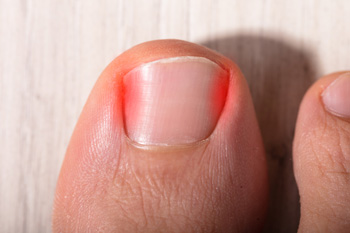
An ingrown toenail is when the corner of the toenail grows into the surrounding skin. This typically happens to the nail on the big toe from improper nail cutting and it can be painful. There may be redness, a hardening of the skin, and swelling around the nail. If an ingrown toenail is not tended to, it can bleed and foul-smelling pus may ooze from it. An infection can also develop, which can spread to underlying bones. Those who have reduced circulation to the feet, such as people who are diabetic or who have peripheral arterial disease, may be more prone to developing ingrown toenails. An infection from a bacteria or fungus can come from an ingrown toenail. Those with risky underlying conditions may find it harder to heal which may lead to severe complications. If you have an ingrown toenail and it is painful or looks like it is infected, it is strongly suggested that you see a podiatrist for immediate treatment.
Ingrown toenails can become painful if they are not treated properly. For more information about ingrown toenails, contact one of our podiatrists of Fusion Foot and Ankle. Our doctors can provide the care you need to keep you pain-free and on your feet.
Ingrown Toenails
Ingrown toenails occur when a toenail grows sideways into the bed of the nail, causing pain, swelling, and possibly infection.
Causes
- Bacterial infections
- Improper nail cutting such as cutting it too short or not straight across
- Trauma to the toe, such as stubbing, which causes the nail to grow back irregularly
- Ill-fitting shoes that bunch the toes too close together
- Genetic predisposition
Prevention
Because ingrown toenails are not something found outside of shoe-wearing cultures, going barefoot as often as possible will decrease the likeliness of developing ingrown toenails. Wearing proper fitting shoes and using proper cutting techniques will also help decrease your risk of developing ingrown toenails.
Treatment
Ingrown toenails are a very treatable foot condition. In minor cases, soaking the affected area in salt or antibacterial soaps will not only help with the ingrown nail itself, but also help prevent any infections from occurring. In more severe cases, surgery is an option. In either case, speaking to your podiatrist about this condition will help you get a better understanding of specific treatment options that are right for you.
If you have any questions please feel free to contact our offices located in Fort Worth and Arlington, TX . We offer the newest diagnostic and treatment technologies for all your foot and ankle needs.


